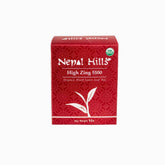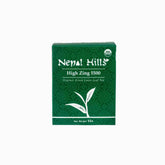Organic Cultivation of Nepal Tea: The Efforts of Small Farmers
Tea is regarded as an elixir (figuratively) by multiple cultures around the world, and it whispers the secrets of the land and the sky. Meaning, the sun and the soil shape the flavor of the tea. Organic cultivation is a natural process of cultivation of food without the use of man-made chemicals. In this blog, we will discuss into the rich world of organic tea cultivation, starting from it’s benefits to the hands-on practice on how we can nurture the tea plants organically. Let’s discuss on this topic without further holdup.
The Essence of Organic Tea
Benefits of going organic
-
Your become healthier and so does Mother earth
- Organic tea is free from synthetic pesticides and chemicals.
- By choosing organic, you safeguard your well-being and support eco-friendly practices.
-
Biodiversity is boosted
- Organic farms host diverse ecosystems, from organisms under the soil to birds and insects roaming around the plantation
- Birds, insects, and beneficial microorganisms thrive alongside tea plants.
Organic farming practices by small farmers
Pest control is done the natural way:
-
Beneficial Insects for Organic cultivation
- Ladybugs, lacewings, and parasitic wasps keep pests in check.
- They feast on aphids, mites, and other tea-hungry bugs.
-
Neem and other herbal defenders keep pests out of the bay
- Nepali farmers use neem and other herbs as natural insecticides.
- These botanical solutions protect tea plants without harming beneficial insects.
Soil enrichment secrets implemented by Nepali small farmers
-
Cattle manure magic
- Nepali farmers raise cattle and use their manure as fertilizer.
- Cow dung enriches the soil with nutrients, improving fertility.

-
Composting and biochar
- Nutrient-rich compost feeds the soil.
- Biochar is produced by heating organic material which enhances water retention and supports microorganisms.
The Certification Conundrum
Why not all teas are Certified organic?
-
Costly Certification
- Organic certification requires hefty fees and meticulous paperwork.
- Small farmers often find it financially burdensome.
-
Artisanal vs. Certified
- Many Nepali teas are organically produced but lack certification.
- Artisanal practices align with organic principles.
- Artisan farms are small, so farmers are able to use manure from their cattle on the farms.
Nepal’s Organic Initiatives
Government’s green directive
-
Traditional Wisdom and Modern Challenges
- Nepali farmers integrate traditional ecological knowledge with modern practices.
- They combat pests and diseases using natural remedies.
- Initiatives by the Nepal government promotes organic practices and self-sufficiency.
-
Environmental Wake-Up Call
- At one point, Nepali teas faced a ban in Europe due to pesticide use.
- This wake-up call led Nepali farmers to wholeheartedly embrace organic cultivation.
- Under the directives of the Government of Nepal, they transitioned to organic practices.
FAQs: Savoring the Organic Brew
- Q: Why choose organic tea?
- A: Organic tea is kind to your health and the planet.
- Q: Is Nepal Hills Tea Organic?
- A: Yes, our teas are organic compliant, meaning they were grown using organic cultivation methods. But we our artisans don't have organic certification.
- Q: What’s the cost of organic certification?
- A: It varies, but small farmers face challenges. Farmers have to spend somewhere between USD 5,000 to 8,000 per year to achieve and maintain the organic certification, which is impossible for them.
- Q: Is artisanal tea organic?
- A: Artisanal practices often align with organic principles.
- Q: How can I support organic tea growers?
- A: Choose organic teas and spread the word.
- Q: What is the difference between organic certification and organic compliant?
- A: Organic certification involves formal approval by a recognized body, while organic compliant means adhering to organic principles without formal certification.
- Q: Why do Nepali farmers use neem and other herbs for pest control?
- A: Neem and other herbs serve as natural insecticides, avoiding harmful chemicals.
Authored By:
Bhaskar Dahal
2nd Generation Tea Entrepreneur
Founder and C.E.O, Nepal Hills Tea Inc.
Tags:





